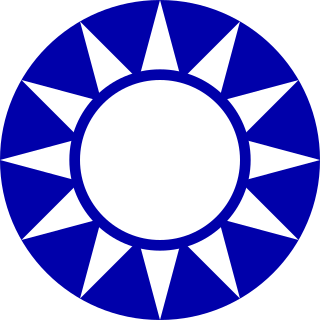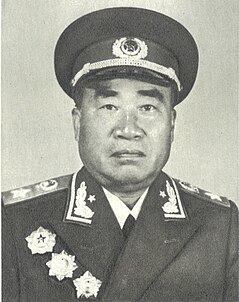
The Revolutionary Committee of the Chinese Kuomintang is one of eight registered minor political parties allowed to superficially oppose the Communist Party of China within the People's Republic of China.

The China National Democratic Construction Association (CNDCA), also China Democratic National Construction Association (CDNCA), also known by its Chinese abbreviation Minjian (民建), is one of the eight legally recognised political parties in the People's Republic of China that follow the direction of the Communist Party of China and are members of the Chinese People's Political Consultative Conference. It was founded in Chongqing in 1945 by the Vocational Education Society, a former member of the China Democratic League.

The China Association for Promoting Democracy is one of the eight legally recognised political parties in the People's Republic of China that follow the direction of the Communist Party of China and is a member of the Chinese People's Political Consultative Conference. It was formed on December 12, 1945.

The Politics of Shanghai is structured in a dual party-government system like all other governing institutions in the mainland of the People's Republic of China (PRC). In the last few decades the city has produced many of the country's eventual senior leaders, including Jiang Zemin, Zhu Rongji, Wu Bangguo, and Huang Ju.

The China Artists Association, originally the China National Art Workers' Association, is the official national association of Chinese artists, with its headquarters in Beijing. It was established in July 1949, with Xu Beihong as its first chairman. It has 6,000 members, and the current chairman is Liu Dawei.
The 11th Central Committee of the Communist Party of China was in a 5 year session from 1977 to 1982. The 10th Central Committee of the Communist Party of China preceded it. It held seven plenary sessions in the 5-year period. It was formally succeeded by the 12th Central Committee of the Communist Party of China.
The 10th Central Committee of the Communist Party of China was in session from 1973 to 1977. It was most certainly preceded by the 9th Central Committee of the Communist Party of China. It held three plenary sessions in the 4-year period. It was formally succeeded by the 11th Central Committee of the Communist Party of China.
Wang Hesheng is a composer of the Military Band of the People's Liberation Army of China, also a member of Chinese Musicians Association. In 1985, he studied composition from Professor Mu Hong in the central Conservatory of Music. He became a professional composer of the Military Band of the People's Liberation Army of China after graduation in 1988.

The Chairman of the National Committee of the Chinese People's Political Consultative Conference is the leader of the National Committee of the Chinese People's Political Consultative Conference, which is a political advisory body in the People's Republic of China. The current Chairman is Wang Yang, who is the 4th-ranked member of the CPC Politburo Standing Committee.

The Central Financial and Economic Affairs Commission, formerly known as the Central Leading Group for Financial and Economic Affairs from 1989–2018, is a commission of the Central Committee of the Communist Party of China at the dependence of the CPC Politburo in charge of leading and supervising economic work of both the CPC Central Committee and the State Council. The Commission is headed by CPC General Secretary or Premier of the State Council.
The 5th National Congress of Kuomintang was held from 12–23 November 1935 at Nanking, Republic of China.
Records of Kangxi's Travel Incognito is a Chinese television series revolves around the Manchu-ruling Qing Empire monarch Kangxi Emperor and the corruption he faces as he tries to make the government run efficiently. The series was directed by Zhang Guoli and produced by Deng Jie. The series consists of a total of 144 episodes shot in high definition, each 45 minutes long. The series is based on the events in the Kangxi era of the reign of Kangxi Emperor during the Qing Dynasty. The series also features Kangxi Emperor's family member and entourage in prominent roles and storylines, most notably his Concubine Yi and eunuch Sandezi and Buddhist monk Fayin, and Concubine Yi's servant girl Xiao Taohong. The program originally aired from 1998 to 2007, spanning five seasons and 144 episodes. For the first four seasons, the show starred Zhang Guoli and Deng Jie as Kangxi Emperor and Concubine Yi respectively. In the last season, John Lone and Irene Wan became the stars.
Order of Liberation was a Chinese military award awarded to heroes of the Liberation of mainland China during the Second Chinese Civil War between 3 September 1945 and 30 June 1950. There are three grades: First Class Medal, Second Class Medal, and Third Class Medal.
Order of Bayi or Bayi Order was a Chinese military award awarded to heroes of the Liberation of China during the First Chinese Civil War. There are three grades: First Class Medal, Second Class Medal, and Third Class Medal.
Huang Dao original name Huang Duanzhang, also known as Yiming was a member of the Chinese Workers' and Peasants' Red Army and the New Fourth Army. He was born in Hengfeng County, Jiangxi Province. He was the father of Huang Zhizhen, who was governor of Hubei Province under the People's Republic of China. He fought in the Chinese Civil War on the side of the Communist Party of China, being active in northern and eastern Fujian near the border with Zhejiang. He remained in southern China after the Long March. During the Second Sino-Japanese War, he was poisoned by the Kuomintang en route to southern Anhui.

Counter-Japanese Military and Political University, also commonly known as Kàngdà (抗大) and Kangri Junzheng University (抗日军政大学), was a comprehensive public university located in Yan'an, Shaanxi, the headquarters of the Communist Party of China during the Second Sino-Japanese War. Its former site has been converted to a memorial hall.
Fang Quan(zh: 方荃 - 字培卿, pinyin: Fāng Quán) was a late Qing Empire Mandarin, scholar, author and educator.
The Order of Republic is the People's Republic of China's highest order of honour. On December 27th, 2015, the National People's Congress passed a law establishing two national orders, the Order of Republic and the Order of Friendship, constituted on January 1st, 2016. It is unknown whether the Order of Republic can be awarded to foreigners or not, but the Order of Friendship is exclusively reserved for foreigners.
Jymoo Zhou is a Chinese artist based in Beijing, China. He focuses primarily on installation art projects and design at the intersection of art, environment, technology.
2nd Independent Corps of Northwestern Military Region was formed on December 19, 1949 in Zhongwei, Ningxia.













